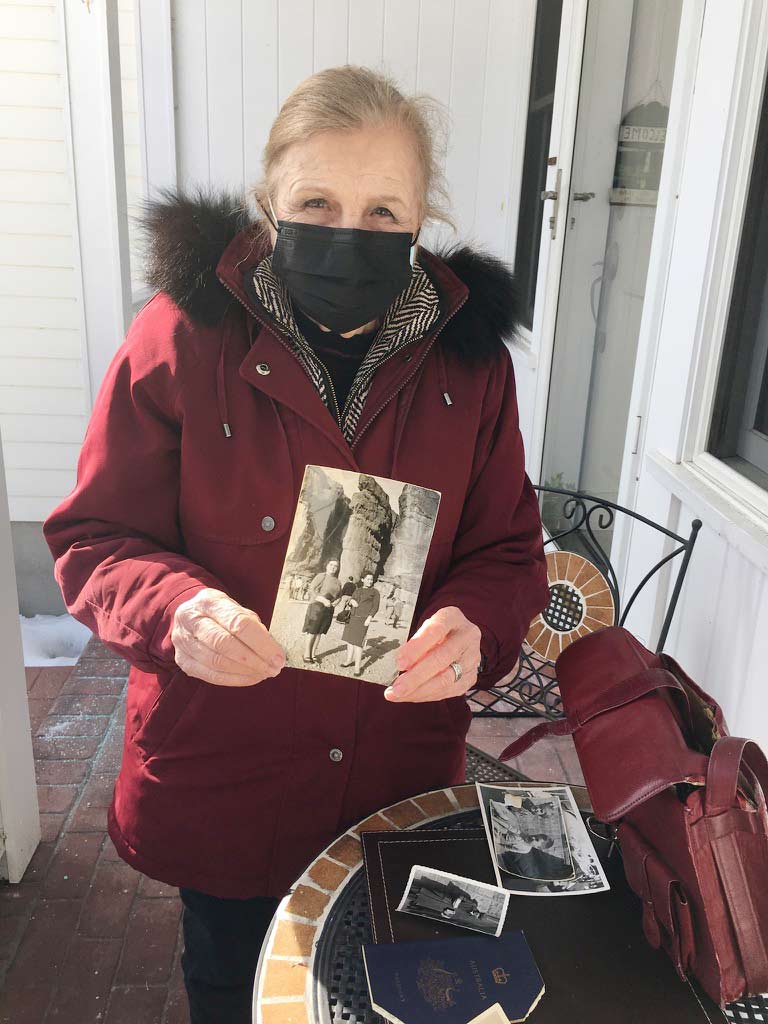Temple Beth Tikvah 2 Way L’Dor V’Dor Project Brings Generations Together, Thanks to the Community Grants for the Jewish Elderly
Helena Schanzer only started asking questions about her own family Holocaust experience as her mother lay dying in Chile. What she learned at that time is basically all she knows. “Many parents didn’t talk about what happened and many children didn’t ask,” Helena said.

Helena Schanzer with her mother’s document bag
Helena Schanzer only started asking questions about her own family Holocaust experience as her mother lay dying in Chile. What she learned at that time is basically all she knows. “Many parents didn’t talk about what happened and many children didn’t ask,” Helena said.
Helena is referring to her family’s experience during the Holocaust as they wandered through the world in order to find a new home. Helena said, “I personally feel embarrassed and guilty for not having shown more interest at the proper time.”
Helena and her husband did things differently, sharing their family history with their own children and grandchildren. Now in her 70’s, Helena is sharing her story more widely.
Recently, Helena told 8th, 9th, and 10th grade students in Temple Beth Tikvah’s religious school about her family’s journey during and after World War II. This was part of a program called 2 Way L’Dor V’Dor, which means from generation to generation in Hebrew. The project, made possible with support from a Community Grant for the Jewish Elderly from the Jewish Foundation of Greater New Haven, aims to increase opportunities for social connection and intergenerational understanding by inviting congregants of all ages to interact.
Helena’s family lived in 8 countries and traveled by boat to 4 continents, learning multiple new languages, getting acclimated to each new place, and starting over with each move. Each move brought uncertainty and worry about which country would accept Jews, how the family would be received and how long they could stay.
Several of Helena’s family members joined the Zoom, including her children, grandchildren, and her brother from Chile. Participants were so engaged that 20 minutes after the program officially ended, no one had left the Zoom!
Even Helena’s daughter said she learned new parts of the story. She didn’t know her grandparents (Helena’s parents) along with thousands of Jews left Poland by walking to the Ukraine. This is about 300 miles, like walking from Madison to Washington, DC. Helena shared that before the Nazi invasion, Poland had a vibrant Jewish community of more than 3 million people. Only 10% of these Jews survived the Holocaust.
Helena stressed that her family’s experience is not uncommon, “It is the story of our people, the Jewish people that have had to move from place to place, from country to country, from continent to continent, in order to survive. And after all we have experienced and suffered, we have survived and thrived.”
Helena encouraged children in her audience to ask their parents and grandparents about their own history. Connections were made by Rabbi Stacy Offner and others about the role of religion and faith, hope, resiliency, current day issues of accountability for war crimes, empathy, and immigration.
“Everyone has a story, and our Jewish community has a shared story,” said Rabbi Offner. “Numbers alone don’t tell our story. 6 million people means 6 million stories, stories of bravery, savagery, evil and goodness. We are each made stronger when we share our stories with each other.”
Helena will share her story again with the larger Temple Beth Tikvah community ahead of Holocaust Remembrance Day alongside others who will share their own Jewish Journey.
“Bringing the generations together offers incredible opportunities for students to hear first person perspectives from people who lived history,” said Donna Fedus, gerontologist educator and 2 Way L’Dor V’Dor project director. “These connections reduce social isolation and strengthen community at Temple Beth Tikvah while breaking down stereotypes about older adults, which will serve the students well throughout their lives. The same strategies could be adapted to work in any faith community.”
